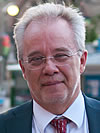
Donald B. Dingwell
University of Munich
2016 Arthur L. Day Medal
Presented to Donald Bruce Dingwell
Citation by Yan Lavallee
It is a great pleasure to present Professor Donald Bruce Dingwell as the recipient of the 2016 Arthur Louis Day Medal. A Canadian geologist by training, Don pursued his career at the Carnegie Institution for Science and then in Germany, as did Arthur Day. Don’s research utilizes the fundamentals of physics and chemistry to provide our community with complete descriptions of silicate liquids, glasses, and magmas. His diverse contributions to petrology, mineralogy, and geology have helped bridge the gap between “equilibrium” in largely static magma chambers, to highly disequilibrium, dynamic systems, where magmas flow, fracture, erupt, and disperse. The merit of his dedicated efforts has illuminated a myriad of magmatic and volcanic phenomena, forming the basis for the new field of experimental volcanology. Please, join me in congratulating Don for the marvelous work he has accomplished and which has pushed the forefront of geological sciences in recent years.
2016 Day Medal — Response by Donald B. Dingwell
Arthur L. Day must have been an inspiring leader in experimental earth sciences. Just over 100 years ago, he participated in some of the first effective proof of the role of water in volcanic eruptions, in Hawaii. On my desk in Munich sits a sample of “uncontaminated pumice” from the Valley of Ten Thousand Smokes (rescued from destruction in the move of the Geophysical Laboratory), and presumably collected in one of the Katmai expeditions (from 1916 on) in which Carnegie scientists participated under Day’s directorship. Further Carnegie work followed in Yellowstone.
Today, we live in exciting times for the experimental geosciences, and nowhere is this more evident than in volcanology. In situ, fully imaged, real-time observations of magma manipulation in processes from multiphase flow to the auto-reactions in the dusty gas phase generated by fragmentation are now within our grasp. They represent a new frontier for geosciences with many implications for conceptual understanding of volcanic eruptions all the way to hazard mitigation and Earth System impact of eruptions. I like to think that Day would have liked it.
It is a truly humbling experience to peruse the list of recipients of his medal and what they subsequently accomplished. That alone will suffice to drive me on for the next decade.
In closing, I thank all who had a hand in this process and thereby recognizing the significance of the work, especially my brilliant colleague from Quebec, Yan Lavallée.
